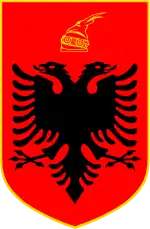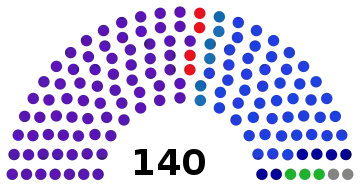| ||||||||||||||||||||||||||||||||||||||||||||||||||
All 140 seats in the Parliament of Albania 71 seats needed for a majority | ||||||||||||||||||||||||||||||||||||||||||||||||||
| Turnout | 53.62% ( | |||||||||||||||||||||||||||||||||||||||||||||||||
|---|---|---|---|---|---|---|---|---|---|---|---|---|---|---|---|---|---|---|---|---|---|---|---|---|---|---|---|---|---|---|---|---|---|---|---|---|---|---|---|---|---|---|---|---|---|---|---|---|---|---|
This lists parties that won seats. See the complete results below.
| ||||||||||||||||||||||||||||||||||||||||||||||||||
 |
|---|
|
|
Parliamentary elections were held in Albania on 24 June 2001.[1] The result was a victory for the ruling Socialist Party of Albania, which won 73 of the 140 seats, resulting in Ilir Meta remaining Prime Minister. Voter turnout was 54%.[2]
Electoral system
The Assembly of Albania has 140 members of whom 100 are elected by plurality vote in single-member constituencies and 40 members are elected through a party-list proportional representation system.[3]
Campaign
President Rexhep Meidani announced on 18 April 2001 that the first round of the elections would be held on 24 June, with the second round on 8 July.[4] The governing Socialist Party had the aim of gaining 60% of the vote, in order to have a sufficient majority to elect a new president in 2002. They campaigned on infrastructure improvements such as communication and transport and on their record in restoring order and economic growth.[5] They were also boosted by achieving the opening of negotiations with the European Union on a Stabilisation and Association Agreement just before the election.[6]
The main opposition party, the Democratic Party of Albania led by ex-President Sali Berisha, had moderated their message after losing the 2000 local elections. They formed a coalition of right wing parties, the Union for Victory Coalition, and said that they were open to dealing with other parties if they won the election.[6] They hoped to make gains due to public concern over corruption and the continuing poverty in Albania.[5]
The campaign was generally peaceful and with no reliable opinion polls most observers expected the ruling Socialists to be re-elected with a smaller majority.[7]
Results
Both main parties initially claimed victory after the first round on the 24 June in which turnout reached about 60%. The governing Socialist party claimed that they won 45 of the 100 seats.[8] Monitors from the Organization for Security and Co-operation in Europe (OSCE) described the election as having made progress towards international democratic standards.[5] However the opposition Democratic party claimed there was widespread intimidation and electoral fraud.[8] Procedural differences led to polling stations being kept closed in Lushnje leading to voting having to be delayed for about 30,000 people.[9] The results of the first round showed that the Socialists won 33 seats as against 17 won by the Democrats.[10]
A run-off vote to decide the winner in 51 districts where no candidate won over half the vote in the first round was held on 8 July. Another 40 seats were decided in proportion to the share of the vote each party won.[11]
 | ||||||||
|---|---|---|---|---|---|---|---|---|
| Party | Votes | % | Seats | |||||
| Constituency | Compensatory | Total | +/– | |||||
| Socialist Party of Albania | 555,272 | 42.27 | 73 | 0 | 73 | –27 | ||
| Union for Victory Coalition | 494,272 | 37.63 | 25 | 21 | 46 | +15 | ||
| New Democratic Party | 68,181 | 5.19 | 0 | 6 | 6 | New | ||
| Social Democratic Party of Albania | 48,911 | 3.72 | 0 | 4 | 4 | –5 | ||
| Unity for Human Rights Party | 34,897 | 2.66 | 0 | 3 | 3 | –1 | ||
| Democratic Alliance Party | 34,262 | 2.61 | 0 | 3 | 3 | +1 | ||
| Environmentalist Agrarian Party | 34,247 | 2.61 | 0 | 3 | 3 | +2 | ||
| Democratic Party of Albania | 13,867 | 1.06 | 0 | 0 | 0 | – | ||
| Demochristian Party of Albania | 12,226 | 0.93 | 0 | 0 | 0 | –2 | ||
| Social Christian Party of Albania | 9,224 | 0.70 | 0 | 0 | 0 | New | ||
| Albanian Democratic Union Party | 8,123 | 0.62 | 0 | 0 | 0 | 0 | ||
| Independents | 2 | 0 | 2 | –1 | ||||
| Total | 1,313,482 | 100.00 | 100 | 40 | 140 | –15 | ||
| Valid votes | 1,290,677 | 96.32 | ||||||
| Invalid/blank votes | 49,310 | 3.68 | ||||||
| Total votes | 1,339,987 | 100.00 | ||||||
| Registered voters/turnout | 2,499,238 | 53.62 | ||||||
| Source: Nohlen & Stöver,[lower-alpha 1] Adam Carr | ||||||||
Aftermath
The constitutional court ruled that voting had to be repeated in eight districts on 22 July and a further two on 29 July.[12] International observers described the elections as a whole as having been free and fair.[13] However the opposition Democrats said they would not accept the results. They described the election as a farce and started a boycott of Parliament.[13] The boycott lasted for six months until January 2002 when Sali Berisha announced that his party was returning to Parliament.[14]
References
- ↑ Dieter Nohlen & Philip Stöver (2010) Elections in Europe: A data handbook, p133 ISBN 978-3-8329-5609-7
- 1 2 Nohlen & Stöver p140
- ↑ "Election Guide". IFES.
- ↑ "News from Albania". Central Europe Review. 2001-04-23. Retrieved 2008-07-27.
- 1 2 3 "Socialists claim Albania poll victory". BBC Online. 2001-06-25. Retrieved 2008-07-30.
- 1 2 "PARLIAMENTARY ELECTIONS IN ALBANIA: A MISSION POSSIBLE?!". Alternative Information Network. 2001-06-21. Retrieved 2008-07-27.
- ↑ "Albania goes to the polls". BBC Online. 2001-06-24. Retrieved 2008-07-30.
- 1 2 Wood, Nicholas (2001-06-26). "Albanian opposition alleges election fraud". guardian.co.uk. London. Retrieved 2008-07-30.
- ↑ "Violence Mars Albania Vote for Parliament". The New York Times. 2001-06-25. Retrieved 2008-07-30.
- ↑ "Albania urged to accept vote result". BBC Online. 2001-07-08. Retrieved 2008-07-30.
- ↑ "Albanian opposition condemns 'ballot fixing'". BBC Online. 2001-07-08. Retrieved 2008-07-30.
- ↑ "Electoral Marathon". Transitions Online. 2001-07-23. Archived from the original on 2005-08-24. Retrieved 2008-07-30.
- 1 2 "Albanian opposition attacks election ' farce'". BBC Online. 2001-07-30. Retrieved 2008-07-30.
- ↑ "As Split of Albania Socialists Worsens, Prime Minister Quits". The New York Times. 2002-01-30. Retrieved 2008-07-30.